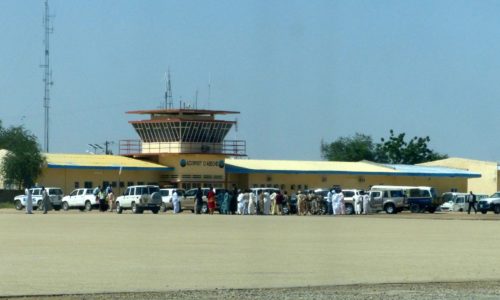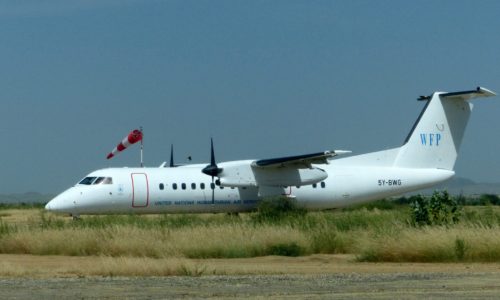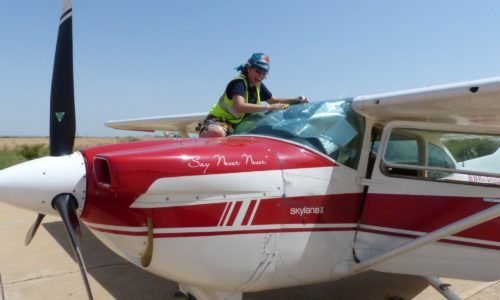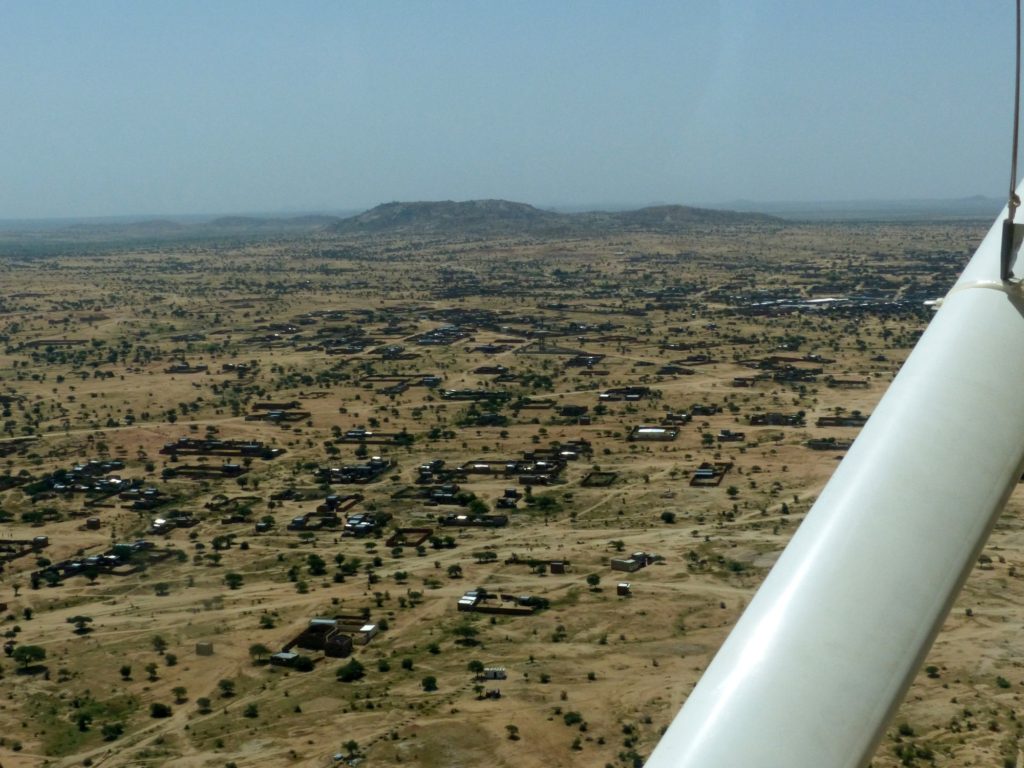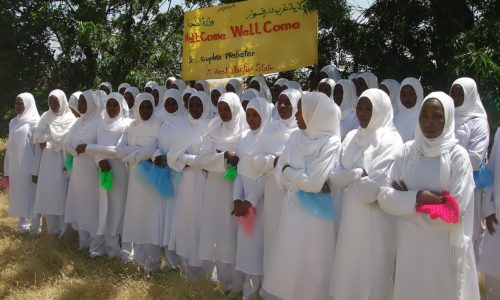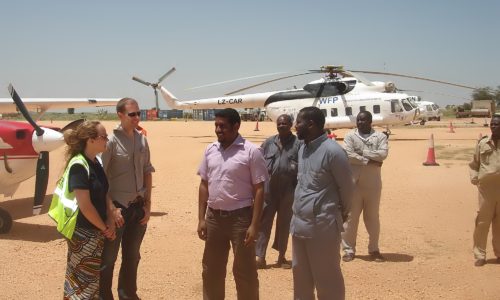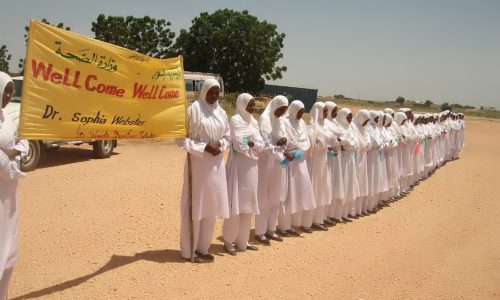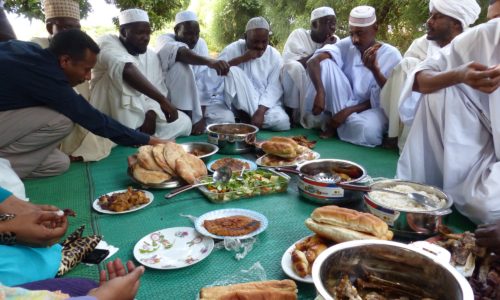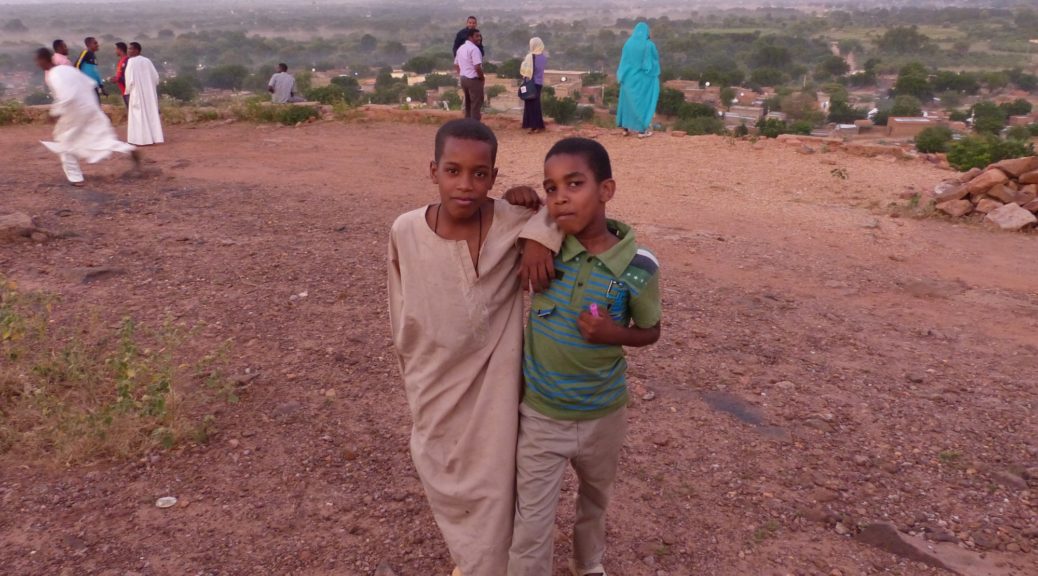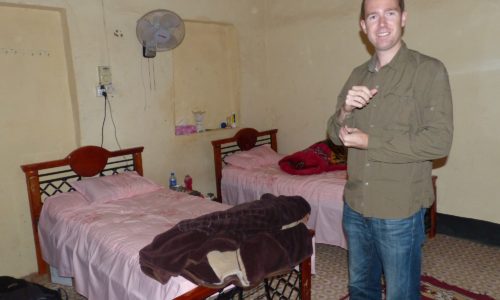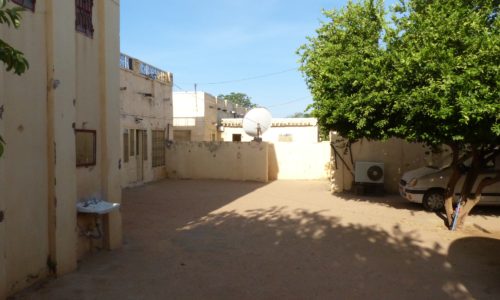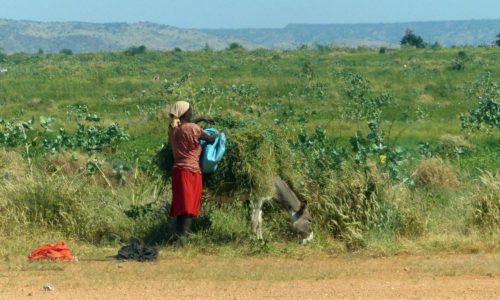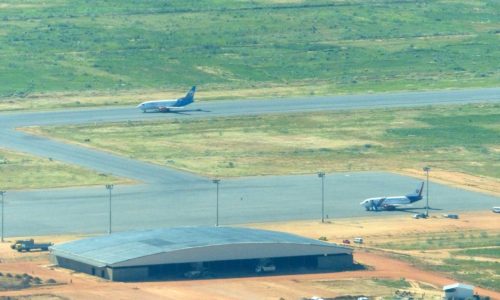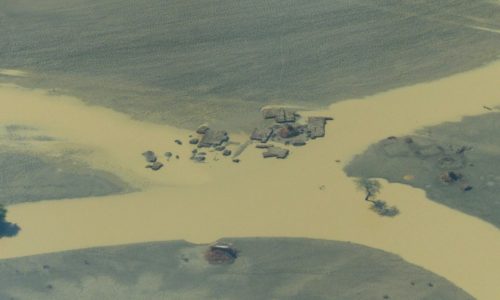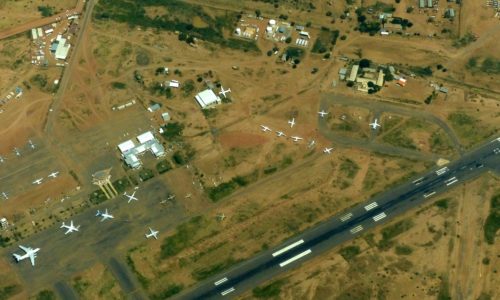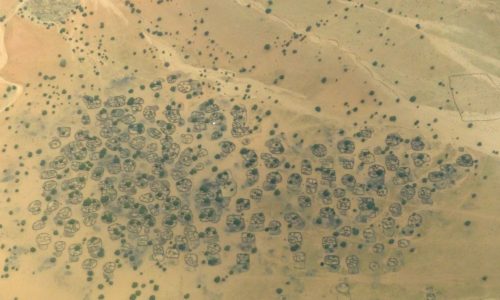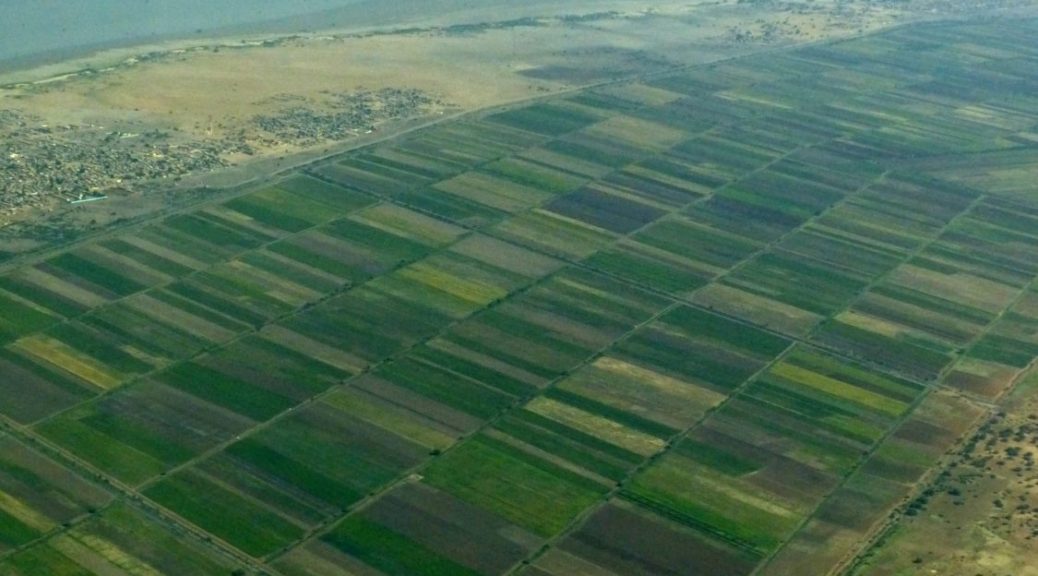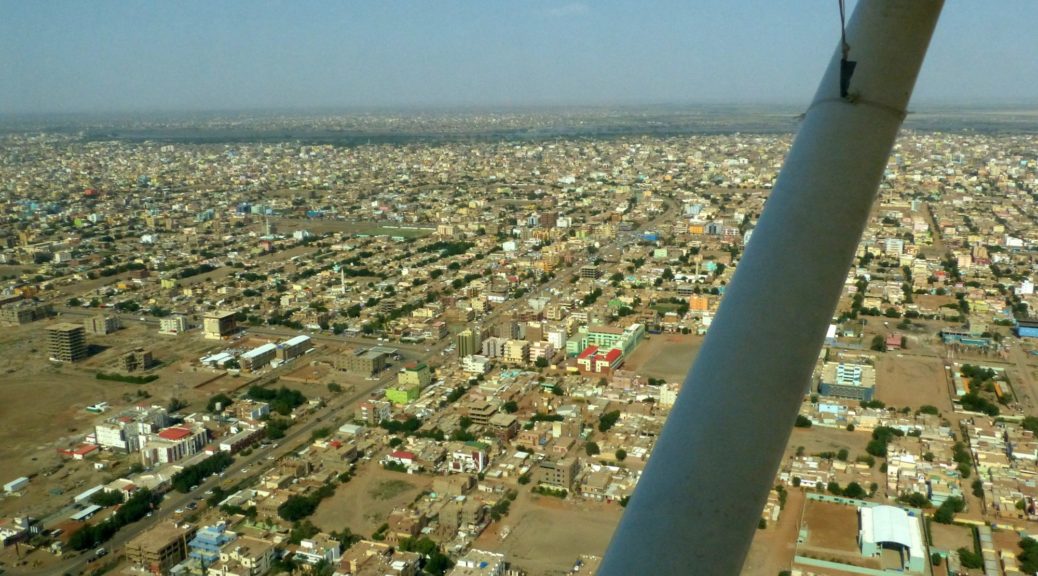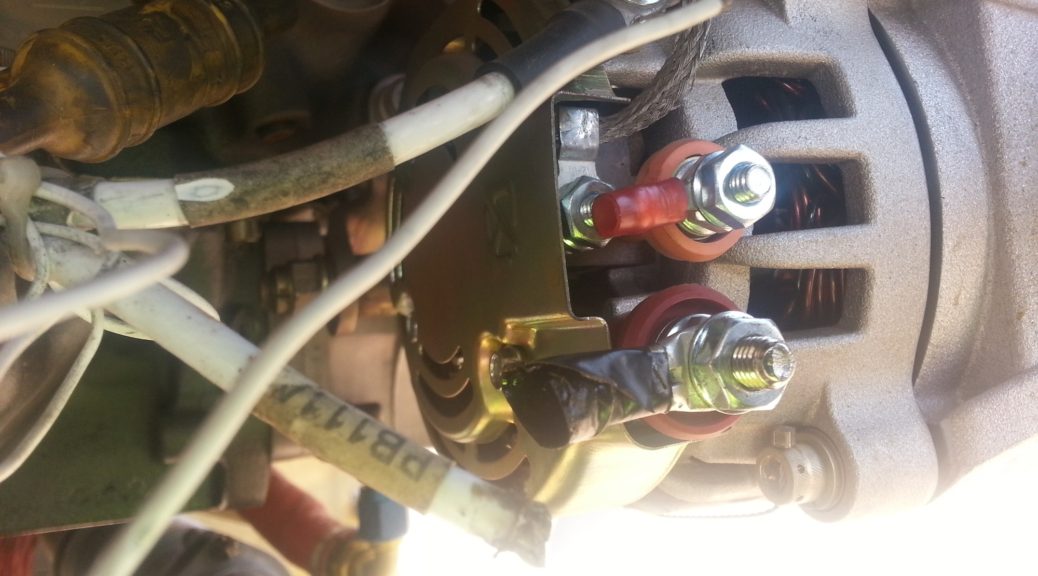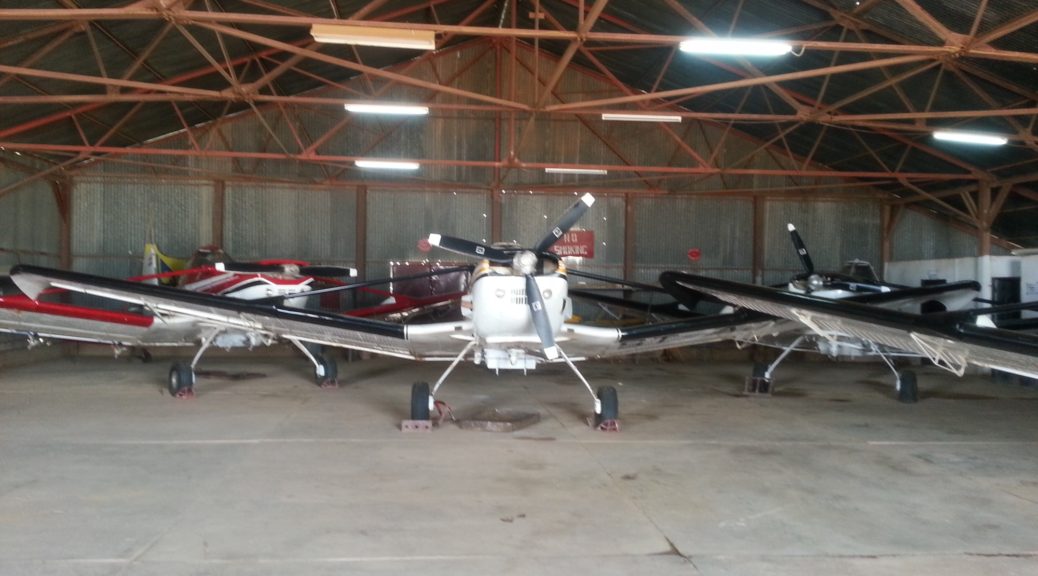Africa – Sudan
Sophia headed off early to try and acquire some currency again, and I made my way to the airport to prepare the aircraft. Despite being before 9am, the temperature was already well over 30 degrees. As I tidied the cabin, the fueler came over to say hello again; we’d met him on arrival yesterday, and having spent three months in the UK studying, he spoke excellent English and seemed to be keen to practice it. When Sophia arrived, not long after I did, I headed over to file the flight plan and pay the landing fees.
As I was doing this, a motorcade of about 15 SUVs and pick-up trucks swept into the airport and arrayed themselves haphazardly near the terminal; all kinds of people jumped out and wandered around waving excitedly to each other. I was told that a local dignitary had arrived, and was awaiting a flight. Soon, another UN twin turboprop arrived, this one in the colours of the “Humanitarian Air Service”. All kinds of people got off; they looked like they might be displaced persons from the locality, and then the local dignitary and his entourage boarded. About half of the vehicles in his extravagant motorcade had also been in UN livery, or badged as “donated by” various bodies. It was interesting to see the uses that these donations were being put to; I couldn’t help but think that they were probably not intended to be used for stroking local chief’s egos when they drove around.
After this circus had subsided, I was able to cross the apron again and ready us for departure. We were cleared to taxi to the holding point, and then wait as yet another UN turboprop touched down. Given the fact that there was only a single taxiway off of the runway, I was curious as to the controllers plan, especially as he’d also cleared the other “VIP” turboprop to line up behind us. In the event, the arrival was told to taxi past and make a 180 on the runway, clearing the way for our little Skylane; luckily, the third aircraft had not yet started its taxi. We took off on runway 09, and didn’t have to change heading at all; the runway was pointed directly at our destination of Geneina, just under 100 nautical miles away.
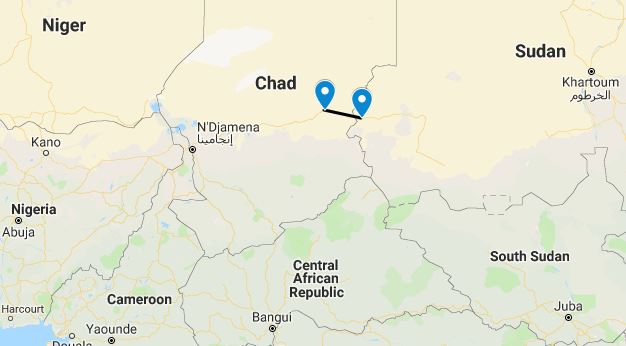
It was difficult in the hot dry air to keep the engine oil temperatures within limits, although flying at reduced power meant we never exceeded the maximum. It was noticeable too, especially on the take-off roll, how the slightly higher elevation (about 2,000ft above sea level) of Abeche, and the hot air, greatly decreased the aircraft performance. With a headwind, the flight to Geneina took a little over an hour; we made contact about 40 miles out and were cleared directly to runway 04, despite the brisk wind being from 140 degrees. I asked for, and was granted, permission to use runway 11; much closer to being into wind.
Geneina has two airport, very close to each other. One, the larger, has a single large, tarmac runway. However, it has no fuel, and is apparently only used for domestic flights. The other has a pair of 6,000ft dirt runways; but is equipped with jet fuel, and can handle international flights. A strange setup. Apparently, the only international flights to ever come are special NGO charters, given that Darfur is not much of a tourist destination and not many people could afford commercial flights even if they were available. We were informed after arrival that we were in fact the first private flight to ever have landed there.
The airport we were headed to was, then, exclusively used by military and NGOs. As we flew down short final, a few people who’d been idly wandering over the runway noticed that an aircraft was coming and increased their pace significantly. We were directed to parking and tie-downs close to a fleet of 6 or 7 enormous UN helicopters, and our welcoming committee. This turned out to be 20 or so local dignitaries, medical staff, and military personnel as well as a choir of around 40 local women, with a banner welcoming Dr Sophia Webster, as well as a song and dance to greet us.
After the welcome was complete, we were bundled into a pickup truck with armed police riding in the bed and taken for a meeting with the Minister of Health for the region. Most of the welcoming committee from the airport (minus the military and the choir) were also in attendance. The Minister for Health, and the Chief Obstetrician, both gave speeches to welcome us and explain something of the health situation in the region. The challenges brought on by the conflict in Darfur were pronounced; in the local region alone they had to cater for more than a million “Internally Displaced People” as well as several hundred thousand refugees from over the border in Chad. Outside of Geneina, it was unsafe to travel by road through almost the entire region, and of course the poor road infrastructure only compounded the issues that people faced in accessing care.
Sophia then gave an excellent speech explaining the project in more detail, and with the meeting concluded we were taken to our accommodation in the UNFPA compound to rest before dinner. The compound was small but comfortable, with an accommodation block of three bedrooms, a kitchen, basic bathrooms, and some offices. It was equipped with power, air conditioning, and internet; but only 12 hours a day, it seemed, due to power shortages. After settling in we even found that there was a washing machine and eagerly loaded our laundry; when travelling in these more “interesting” places hygiene and cleanliness are very challenging (the facilities are certainly never properly cleaned, and dirt and bugs are to be found everywhere, even in the hospitals!) Hitting the “On” switch unfortunately overloaded the power and shut down the entire compound, but before long the ancillary generator was brought online and our very troublesome laundry was completed.
After a few hour’s rest we were collected by our escorts and taken for dinner. We drove through the centre of the city, passing a couple of UN convoys; enormous military trucks full of soldiers, flanked by pick-ups mounted with heavy machine guns. A half-overgrown track took us to a small dirt parking area where we dismounted and followed our hosts on foot. We emerged into a clearing, with the occasional mango tree scattered around, and a large sheet spread out underneath one; on this sheet, 20 or so of the local doctors and other medical figures were seated waiting for us to join the outdoor meal! Plates of food were quickly brought and spread out in the centre, and all tucked in; the local food was excellent. We were told that this was a fairly regular gathering for a Friday.
After dinner we went for a walk in the nearby “wadi”, the riverbed which was now nearly dry as the rains receded. It seemed to be a popular place for picnics, football, and just going for an evening stroll. From here we were taken up to the hills overlooking Geneina, which offered a commanding view over the entire city. Once could go and walk around the old Sheikh’s mansion, which had been ransacked during some of the more violent period of the Darfur conflict and now lay abandoned. All too soon, it was time to get back to the compound; apparently as foreigners we had to be secured by 8pm for our own safety…

An early departure was planned, as usual in these areas, to try and avoid the heat. Our little convoy wound its way back to the military airport, where numerous UN helicopters were being prepared for flight. Sophia took the luggage to pass through security scanning, while I prepared the aircraft and supervised the refuelling. Once again we had an audience of 20 or so people watching us get ready for flight. Despite the full load of fuel we used only a little of the dirt runway to get airborne, and climbed out towards the east. The aircraft’s “low voltage” light was still on during the climb; this usually extinguishes during the takeoff run when the engine RPM gets high enough to properly drive the alternator. The instruments showed that the battery was being charged, albeit at a slower rate than normal, and the warning light went out after a few minutes. With all the electrical trouble we’d had before, I elected to keep a close eye on it.
The first hundred miles of the route took us over a small range of mountains, before flying over the cit of El Fashir. The airport here was extremely busy, the vast majority being UN traffic. Numerous helicopters were coming and going, as well as a couple of Ilyushin 76 cargo aircraft. The sanctions against Sudan apparently make it impossible to operate US manufactured aircraft, so Russian models are extremely common.
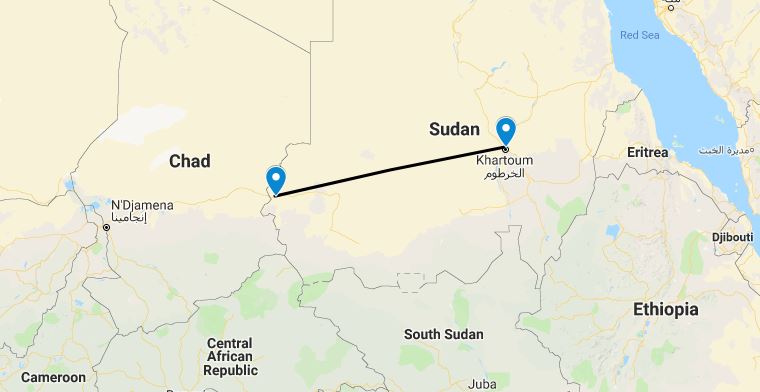
Between El Fashir and Khartoum is just empty desert; much the same as between Geneina and El Fashir. At our altitude of 9,500ft it was impossible to contact any ground stations over the radio so we flew on in peace and quiet. About 150 nautical miles out of Khartoum, I heard some electrical noise over the intercom; an immediate glance at the ammeter showed the needle flickering between charging and discharging, before settling a few seconds later on “discharging”. Moments later the low-voltage warning light came on. Here we go again…
We shut down all non-essential electrical equipment, and pulled the circuit breaker to the alternator. Switching the engine control to mechanical backup mode lost us about 10 knots speed, but at least it would now keep running should the battery run out! I was concerned that we had no contact with Khartoum; an electrical failure for an unknown reason (even if we had our strong suspicions) always holds the potential for further complications, so it would be good for someone to know our situation. Additionally, while there are procedures for loss of communications if power to the radios ran out, I preferred not to arrive at Khartoum International entirely unannounced; it always seems hit and miss in Africa if flight plans are even transmitted to the destination.
With no contact over radio with Khartoum, I managed to enlist the help of a British Airways 777 over the international emergency frequency, 121.5. They were incredibly helpful, and when they couldn’t contact Khartoum over the VHF either they used their satellite phone instead and managed to get through that way to pass all our details on to ATC at our destination. A while later we made direct contact with Khartoum, and they cleared us for the visual arrival to runway 36 while we were still quite some distance away.
Approaching Khartoum, the landscape changed dramatically. In much the same was as in Egypt, the river Nile was marked by a lush band of green either side of it, as people irrigate the land with the readily available water. As we came onto final approach it was possible to see the point at which the Blue and White Niles meet to form the Nile proper, out beyond the airport. Coming closer still to the runway, we could see no fewer than 7 fire trucks which had been deployed for our arrival! Landing was normal, now that I was used to the tendency of the engine to cut out when pulled to idle throttle in mechanical mode, and we followed the marshaller’s car to our spot on the apron. As soon as I stepped out of the aircraft I was greeted by our handler Mohamed, and the head of safety for the airport, and whisked away to the airport offices to write my report of the event!
The writing of the report was a fairly quick and simple event. The subsequent filing and distribution, which for some reason I had to hang around for, took a little longer. We were informed that we should submit another report, of the diagnosis and repair of the failure, which the safety department would analyse before clearing our aircraft for flight again. This was an added layer of hassle that we could do without, especially if the problem turned out to be more than a simple broken wire. Mohamed and I then stopped at the Bluebird Aviation hangar to check for mechanics who could help out, but being Sunday no-one was around. We headed, then, to collect Sophia and meet our host for the next few days, Dr Halla. Conveniently her apartment was just a ten minute drive from the airport, and before long we were sitting down to an excellent dinner, just what we needed after yet another exhausting day.
That evening Halla took us out for a drive around the city of Khartoum. It was the most modern and developed city we’d visited so far, and very reminiscent of Cairo. We took in all three rivers, as well as much of the city’s architecture; both the colonial buildings such as the University of Khartoum, and the more modern structures such as the Chinese-funded “Friendship Centre” where a celebration was underway for the anniversary of the founding of the People’s Republic of China. Tour complete we were taken for ice cream, a rare treat that we’d not seen in a while!
I woke at 9, with Mohamed our handler due to collect me at 10. He’d told me that there was no point going earlier as no-one would be at work yet. Over breakfast I met Sophia’s friend Amie who had flown in on Egypt Air, arriving at 3am, and would be spending the next few days with us before flying with us to Ethiopia. Mohamed picked me up on time (quite rare in Africa!) and we drove to the airport. His English was excellent, for good reason it turned out; he had lived for quite some years in the UK, and was even resident in Cambridge for a couple of years during the time I had been there. We had plenty in common to talk about, and I thoroughly enjoyed his company.
After a visit to security to get me a “pass” (which turned out to be my name written on the back of a spare sheet of paper, with a stamp put next to it) we were driven airside by Wail, a mechanic working for the locally based DAL group. Their offices were in the Bluebird hangar. Through various sources we had identified a company on the field who operated Cessnas, albeit Cessna Ag-Truck crop spraying aircraft. Nonetheless they were our best bet, and so we went to inquire whether they could help us. They were very welcoming and had us bring the aircraft over to their hangar; fortuitously we had been parked only about 30 metres from their facility so we pushed the aircraft over without starting up. Before long we had the cowling off and had identified the problem; not one, but two broken wires this time!
This turned out to be an easy fix, and we soon had everything connected back the way it should be. A quick engine run-up confirmed that things were working again, and before leaving for the day we elected to remove the aircraft battery for charging to ensure that we had enough power to start up again for departure!
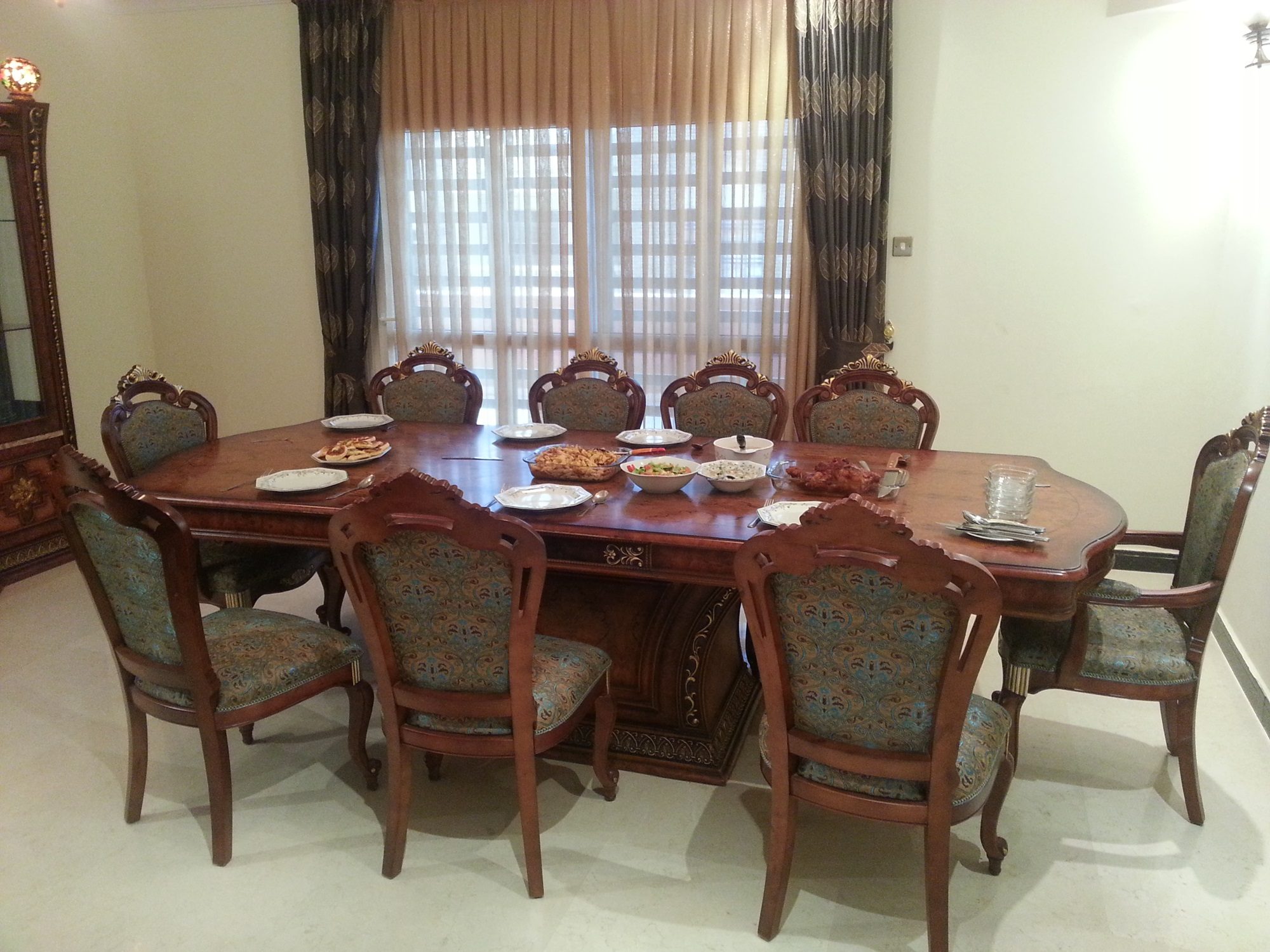
That evening we went out to the shops nearby; everything seems to stay open very late in Khartoum, probably because the heat wipes out much of the day time. Shopping with 4 girls went as one might expect, but I did at least manage to find an electronics store to amuse myself. On the way back we stopped in at a fast food restaurant near the apartment; despite having already had a good dinner, Halla was always adamant that we should be eating more! Her children told us that fast food was one of the things they missed from when they lived in Britain; apparently the options in Sudan were not up to standard. From the chicken that I had, I was inclined to agree.
Once again, Mohamed collected me at 10 to head to the airport. First task was to complete our report of the repair, and submit it to the safety department. I wrote up an official looking document in Microsoft Word, together with photographs documenting the fault and repair, and we took it for submission. The head of safety seemed well pleased, and asked if we could send him the photographs for use in his own report; I just managed to stop Mohamed forwarding the emailed copy that I had sent him and the mechanics in Europe, with the email text describing how I had omitted the second wire and any mention of prior problems from the report to keep things simple!
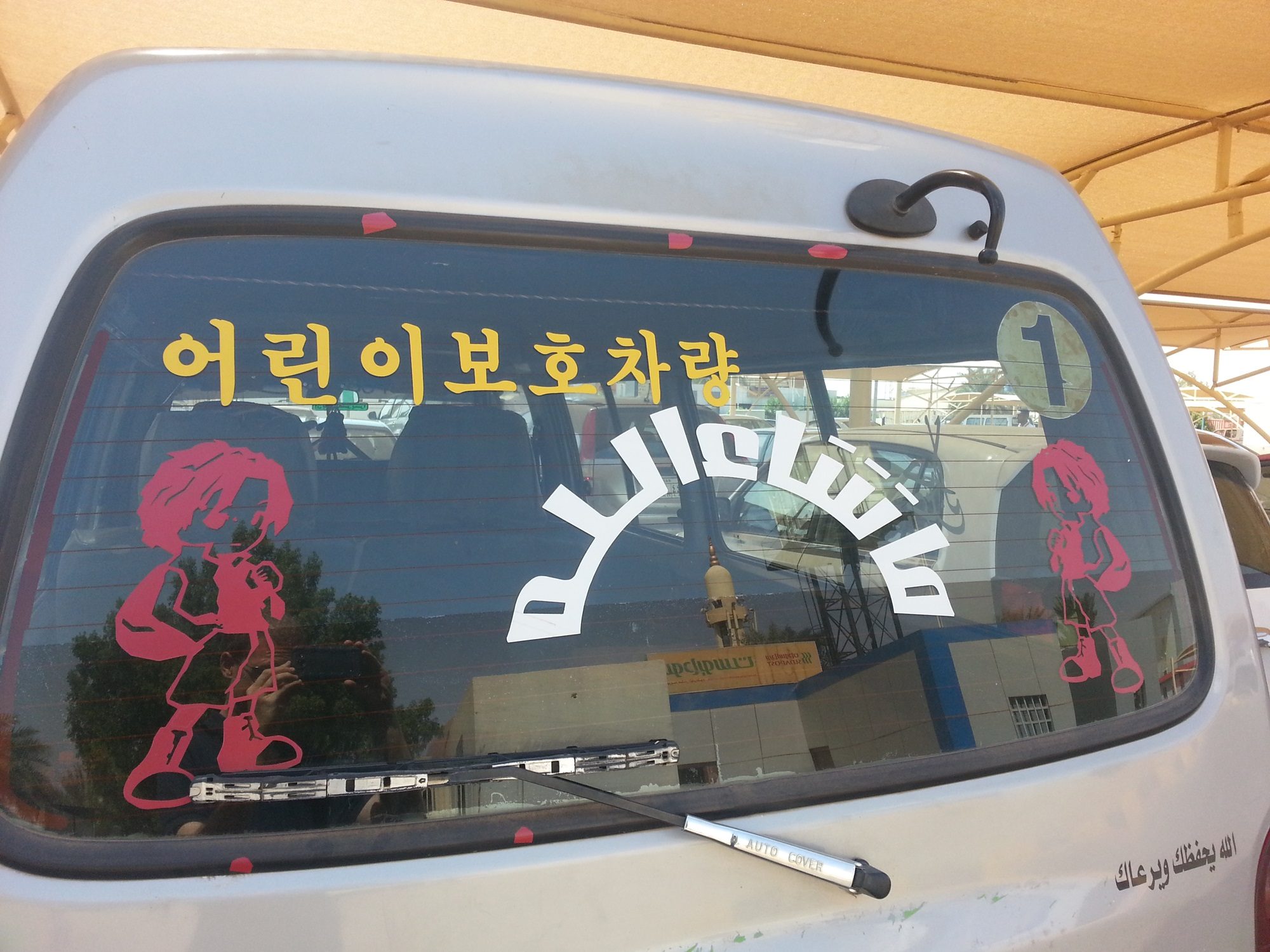
Report submitted and, thankfully, accepted we headed to the aircraft for fuel. Airport rules stated that we could not take fuel outside the hangar, so we had to push the aircraft 20 metres onto the main apron, refuel, and then push it back to the original starting place. A group of ten or so airport ground staff watched us with amusement.
From here, it was time to visit the Bluebird hangars again. We had informed the aircraft owner more than a month ago that the engine was using more oil than expected, and that we’d need to be replenished in Sudan. He had promised to have a box shipped to us, and had recently informed me that it could be found at Bluebird. Unfortunately, nobody at Bluebird had ever heard of the owner or the very specialist oil that we needed. I elected to email for more information that evening so I could find exactly who I needed to talk to; without oil, we wouldn’t be getting far.
Finally, we headed back to the ADS maintenance hangars to replace the battery. I flicked on the electrics to ensure that all was in order; disaster, a new warning light had come on! This time it was the “14V Fault” light, indicating an issue with the low voltage system that runs in parallel with the main 28V system. With no time to fix the matter that day, we arranged to return the next day for diagnosis and, if we were lucky, repair.

The original plan had been to depart the next day. However, with technical trouble, no oil, and no Ethiopian permit it was clear we were going nowhere. The permit delay was slightly absurd; the Ethiopian CAA had a few weeks previously requested a phone call from the medical contacts in-country to confirm that we were expected. Sophia had sent this request on to the professor she’d been talking to, who had then proceeded to completely ignore it. He would not return emails or even answer his phone; even after expanding the request to several other members of the organising committee of the conference Sophia would be attending, no-body would lift a finger to make a simple phone call. It took intervention by some other conference attendees, who arrived in the country and tracked down the local staff face-to-face, before this triviality was taken care of!
Next day, I was dropped at the airport by our hosts and met up with Mohamed. First task was to carry out a careful inspection of all wiring in the tail of the aircraft, where the battery and voltage inverters were housed. All was found to be in order, so I elected to carry out a ground run to see if the issue would clear up with the alternator running. As it turned out, even before starting up the engine the warning light that was present the previous day remained unlit today; it seemed that a few cycles of power were required to reset the system after the battery had been entirely removed. It was lucky that the apparent problem had such a simple solution.
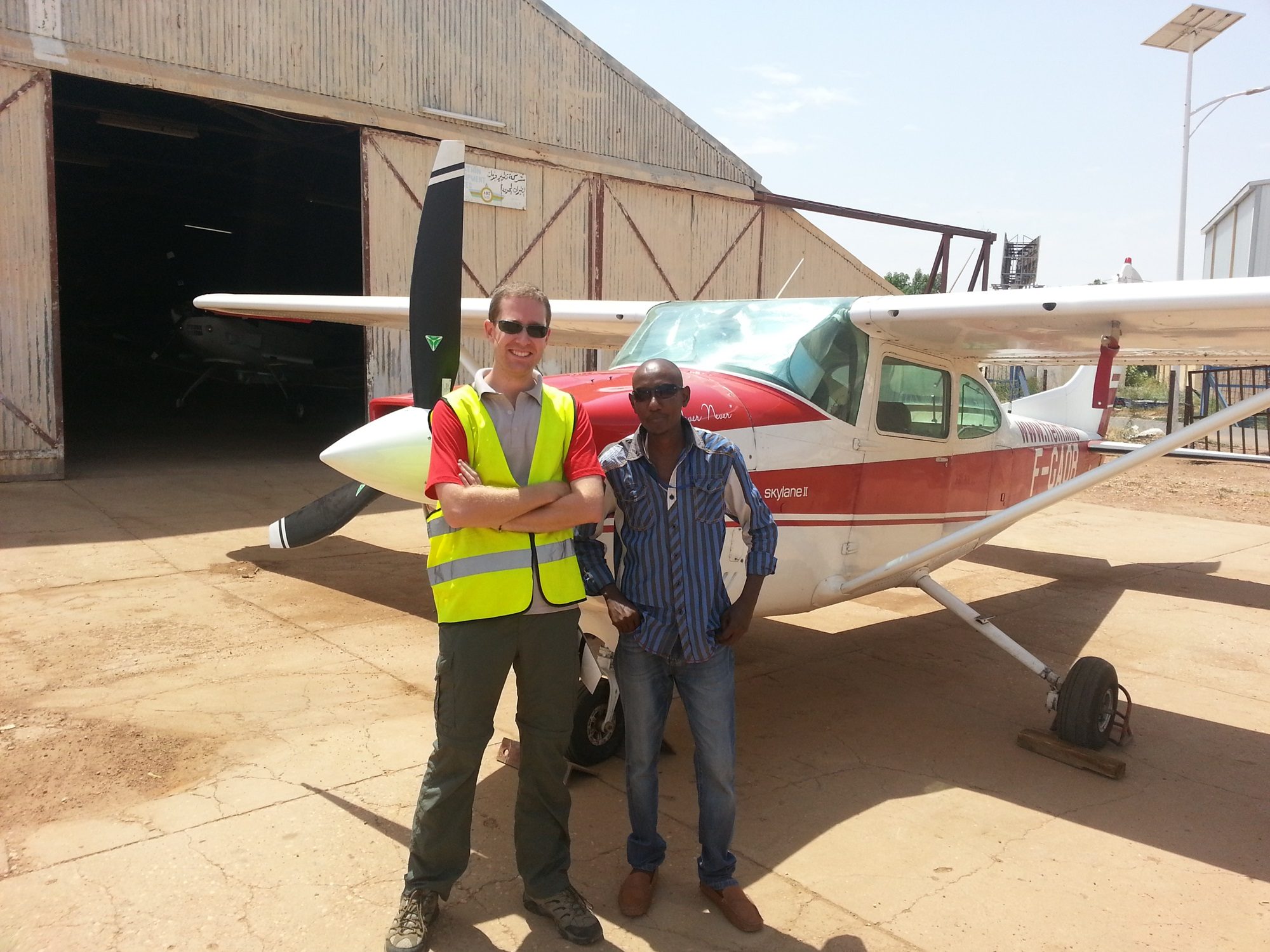
Now, the oil; talking further with Bluebird it turned out that the package was to be carried out from Europe on the Falcon 50 private jet belonging to DAL group. Unfortunately it turned out that this jet was in Geneva for maintenance and there was no set date yet for it to return. The shipping of oil had it seemed, despite over a month’s notice, been a complete failure. SOme other maintenance work was also to have been carried out on the aircraft at this stop, but it turned out that the mechanic who was going to do it was not even in the country during our stop. At this stage I would probably have been more surprised if something had actually worked as promised, rather than yet another problem.
We still had sufficient oil on board to reach Nairobi, so in parallel with the efforts to have oil delivered there (which I had no confidence in happening) I started making enquiries about renting a replacement aircraft from Kenya onwards to ensure we weren’t stranded.
The permit for Ethiopia had, thanks to hard work from Sophia and the permit agent Mike Gray, been granted. This was to be our last night in Khartoum, then, and Amie and I went out for an evening walk with Halla’s oldest son, all the way to the banks of the Nile. This was evidently a popular evening destination, for cars were parked solidly for streets around. Along the river bank tables and chairs were set up, with small stalls selling tea and other refreshments. Sadly, as with elsewhere in the city, the ground was littered with rubbish which rather spoiled the sights.
Click here to read the next part of the story.



